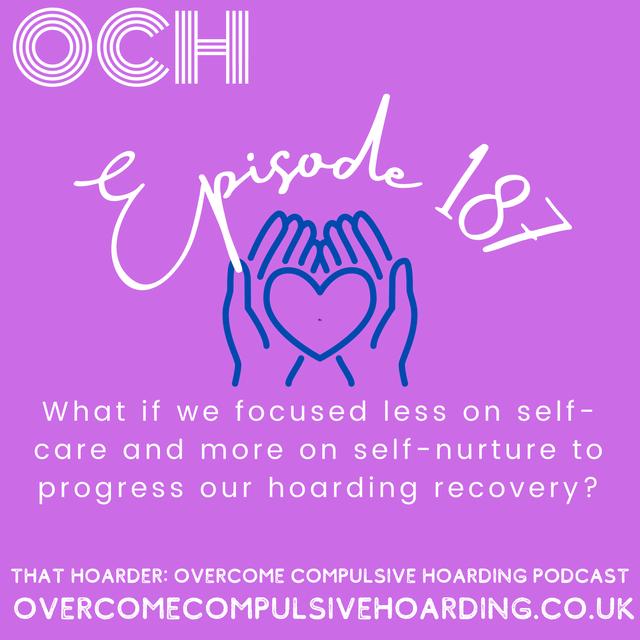
#187 What if we focused less on self-care and more on self-nurture to progress our hoarding recovery?
May 23, 2025•37 min•Ep. 187
Episode description
- Come to a Dehoarding Accountability Zoom Session: http://www.overcomecompulsivehoarding.co.uk/ticket
- Subscribe to the podcast: https://www.overcomecompulsivehoarding.co.uk/subscribe
- Podcast show notes, links and transcript: http://www.overcomecompulsivehoarding.co.uk/
Self-care gets a lot of airtime these days, but I’ve started rethinking what it actually means, especially when you’re struggling with hoarding disorder. In this episode, I talk about why marketed, consumer-driven “self-care” just adds more pressure, and why nurturing yourself with compassion, connection, and practical routines is far more effective. Plus, I share some genuinely helpful, low-cost ways to support yourself without adding to the clutter - or your to-do list.
- Self-Care in Modern Times
- Evolution of the meaning of “self-care”:
- The older, practical definition (basic hygiene, nourishment)
- Current consumer-driven, extravagant interpretations
- Critique of modern self-care commercialisation
- Challenges of Hoarding and Mental Health Struggles
- Emotional toll of hoarding disorder
- Stress, anxiety, depression, trauma, grief
- The exhausting process of trying to “fix” things
- Daily stressors of living in a hoard
- Feelings of failure, constant reminders, adrenaline spikes from unexpected visitors, tripping over items
- The Real Purpose of Self-Care
- Balancing negative emotions (stress, grief, trauma) with activities that nurture the soul
- Evaluating popular self-care advice
- The problem with universal, commercialised recommendations
- Importance of individualised, inward-looking approaches
- Introducing the Concept of "Self-Nurture"
- How self-nurture differs from self-care
- Greater compassion, sustainability, and personalisation
- Emphasis on looking inwards for individual needs
- Practical examples of self-nurturing activities
- The Pitfalls of Commercialised Self-Care
- The “shoulds” culture and guilt surrounding unmet self-care standards
- Surface-level versus meaningful acts of care
- How marketed solutions often do not address real needs
- Guilt and shame when unable to practice recommended self-care (especially for those who hoard)
- Consumer Culture and Self-Care
- Self-care as a commodified experience: Encouragement to buy unnecessary products
- How this affects people who hoard
- Risk of exacerbating clutter by acquiring more as “self-care”
- Focus on external fixes rather than internal wellbeing
- The Benefits of Self-Nurture
- Self-nurture as inexpensive or free
- Focus on activities rather than acquisitions
- Finding joy or restoration in simple practices (e.g., using what you have, accessing the library, running without specialised gear)
- Compassionate Self-Nurture in Practice
- Asking internal questions about core needs (physical, emotional, psychological)
- Treating oneself as one would treat a person they love
- Emphasis on gentle, non-critical, incremental progress
- Drinking water for wellbeing rather than obligation
- Time in nature, connecting with friends, creativity, self-acceptance
- Building Emotional Security and Gentleness
- Establishing emotional security as a core need
- Managing self-criticism and reaching out for connection despite anxiety
- Celebration of small wins and progress
- Validating and acknowledging difficult feelings with compassion
- Evaluating and Choosing Nurturing Activities
- Key questions to ask: “Will this nurture me emotionally, psychologically, or physically?”
- Differentiating between genuine needs and justifying unnecessary purchases
- Avoidance of reinforcing negative patterns through acquisition
- Developing a Personal Toolbox for Self-Nurture
- Gathering and customising strategies that work
- Routines and coping mechanisms
- Taking stock of helpful techniques, personalising approaches
- Recognising and valuing unique sources of restoration
- Top Tip
- DIY, low-cost tip for cleaning the dishwasher with household items
- Encouragement to take any step, however small, towards self-nurture
Links
- The "feeling your feelings" episode
- Episodes talking about the inner critic: with Steve Chapman; about the song that changed everything for me; and about making mistakes
- Come to a Dehoarding Accountability Zoom session: Accountability Booking Form
- Website: Overcome Compulsive Hoarding
- Become a Dehoarding Darling
- Submit a topic for the podcast to cover
- Questions to ask when dehoarding: https://www.overcomecompulsivehoarding.co.uk/podquestions
- Instagram: @thathoarderpodcast
- Twitter: @ThatHoarder
- Mastodon: @[email protected]
- TikTok: @thathoarderpodcast
- Facebook: Overcome Compulsive Hoarding with That Hoarder
- Pinterest: That Hoarder
- YouTube: Overcome Compulsive Hoarding with That Hoarder
- Reddit: Overcome Compulsive Hoarding with That Hoarder subreddit
- Help out: Support this project
- Sponsor the podcast
For the best experience, listen in Metacast app for iOS or Android
Open in Metacast